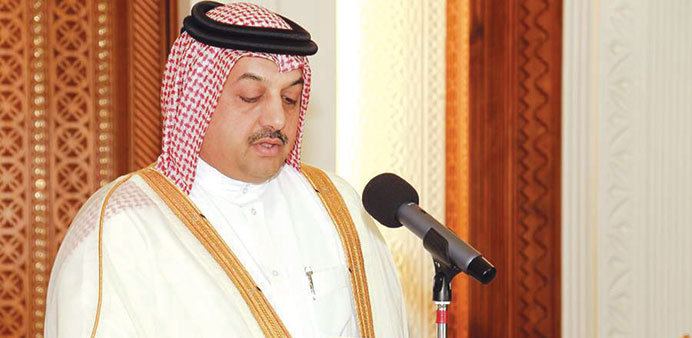Agencies
Qatar yesterday dismissed demands by three fellow Gulf Arab states for changes to its foreign policy, calling its independence “non-negotiable”.
In an unprecedented move within the Gulf Co-operation Council alliance, Saudi Arabia, the United Arab Emirates and Bahrain recalled their ambassadors from Qatar on March 5, claiming that Doha had failed to abide by an accord not to interfere in each others’ internal affairs.
Addressing a session at a top institute in Paris yesterday, HE the Minister of Foreign Affairs Dr Khalid bin Mohamed al-Attiyah noted that “the independence of Qatar’s foreign policy is simply non-negotiable and therefore, I strongly believe that the recent statements made by Saudi Arabia, the United Arab Emirates and Bahrain have no relationship whatsoever with the internal security of the GCC countries, but they are related to clear differences in views on international issues”.
He further said: “We regret for these recent statements, however, but we have our own views and (make) our own decisions.”
The session at the Paris Institute of Political Studies was attended by a number of government officials, teachers and students.
On withdrawal of Saudi Arabia, the UAE and Bahrain of their ambassadors from Qatar, al-Attiyah made clear that the State of Qatar was pursuing an independent foreign policy free from any external influence and it did not follow the “axes mentality” prevailing in the Middle East.
“Our principles and values have not changed over time and Qatar is to take its decisions and follow a path of its own,” the minister stressed.
Al-Attiyah stressed that one of Qatar’s basic foreign policy principles was its support for popular aspirations to justice and freedom in the Arab world. “In this context, everyone should understand Qatar’s support to the emerging democracies that followed the Arab Spring.”
Al-Attiyah said Qatar “provides a forum for all those who do not belong to any bloc to come and exchange their views”, but said this did not mean that Doha agreed with them. “Our policy is based on openness towards all, and we do not want to exclude anyone.”
Qatar’s Cabinet voiced “regret and surprise” last week at the withdrawal of the Saudi, UAE and Bahraini ambassadors but said Doha would not respond in kind and that it remained committed to GCC security.
A source close to Qatar’s government said last week the dispute had more to do with issues in the wider Middle East such as the crises in Egypt and Syria, than about matters affecting fellow Gulf states.
The GCC, formed in 1981, also includes Kuwait and Oman.
Al-Attiyah, in his speech yesterday, underscored that Qatar had chosen not to remain on the fringe of history and had thus decided to play a significant role in world affairs, communicate with the other countries and mediate to settle disputes and work to halt fierce conflicts and care for refugees.
He termed Qatari-French relations as “close, strategic and long-term”.
“He also said that the due concern and attention Qatar enjoys in France should be seen in the context of mutual gratitude, shared values and similar outlook to life, stressing that Qatar’s investment in France stems from the full confidence in the French economy and the French people,” the official Qatar News Agency (QNA) said in a report.
The minister said that around 100 French companies were operating in Qatar. He put the number of French citizens living in Qatar to more than 4,000.

